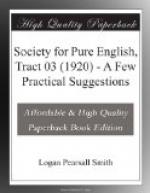But this is just where what is called ‘the rub’ comes in. It would, for a month or two, look so peculiar a word that it might require something like a coup d’etat to introduce it. And yet the schools of music in London could work the miracle without difficulty or delay.
Swine. Americans still use the word pig in its original sense of the young of the hog and sow; though they will say chickens for poultry. In England we talk of pigs and chickens when we mean swine and poultry. Chaucer has
His swyn his hors his stoor and his pultreye.
The verb to pig has kept to its meaning, though it has developed another: the substantive probably got loose through its generic employment in composite words, e.g. guinea-pig, sea-pig, &c.; and having acquired a generic use cannot lose it again. But it might perhaps be worth while to distinguish strictly between the generic and the special use of the word pig, and not call a sow a pig, nor a hen a chicken. So hog and sow might still have their pigs and be all of them swine.
Swift. Perhaps it is going too far to say that ‘swift’ is colloquial only in metaphorical applications, we might speak of ‘a swift bowler’ without exciting surprise; but it is expedient to restore this word to general use, and avoid the use of fast for denotation of speed. ’To stand fast’ is very well, but ‘to run fast’ is thoroughly objectionable. Such a use destroys the sense of firmness which the word is needed and well qualified to denote.
Chide. This word probably needs its past tense and participle to be securely fixed before it will be used. It is perhaps wholly the uncertainty of these that has made the word to be avoided. Chid and chidden should be taught, and chode and chided condemned as illiterate.
NOTE ON ‘DYING WORDS’
Diderot in his Lettre sur les Sourds et Muets deplores the loss of good old terms in the French of his day; he writes:




